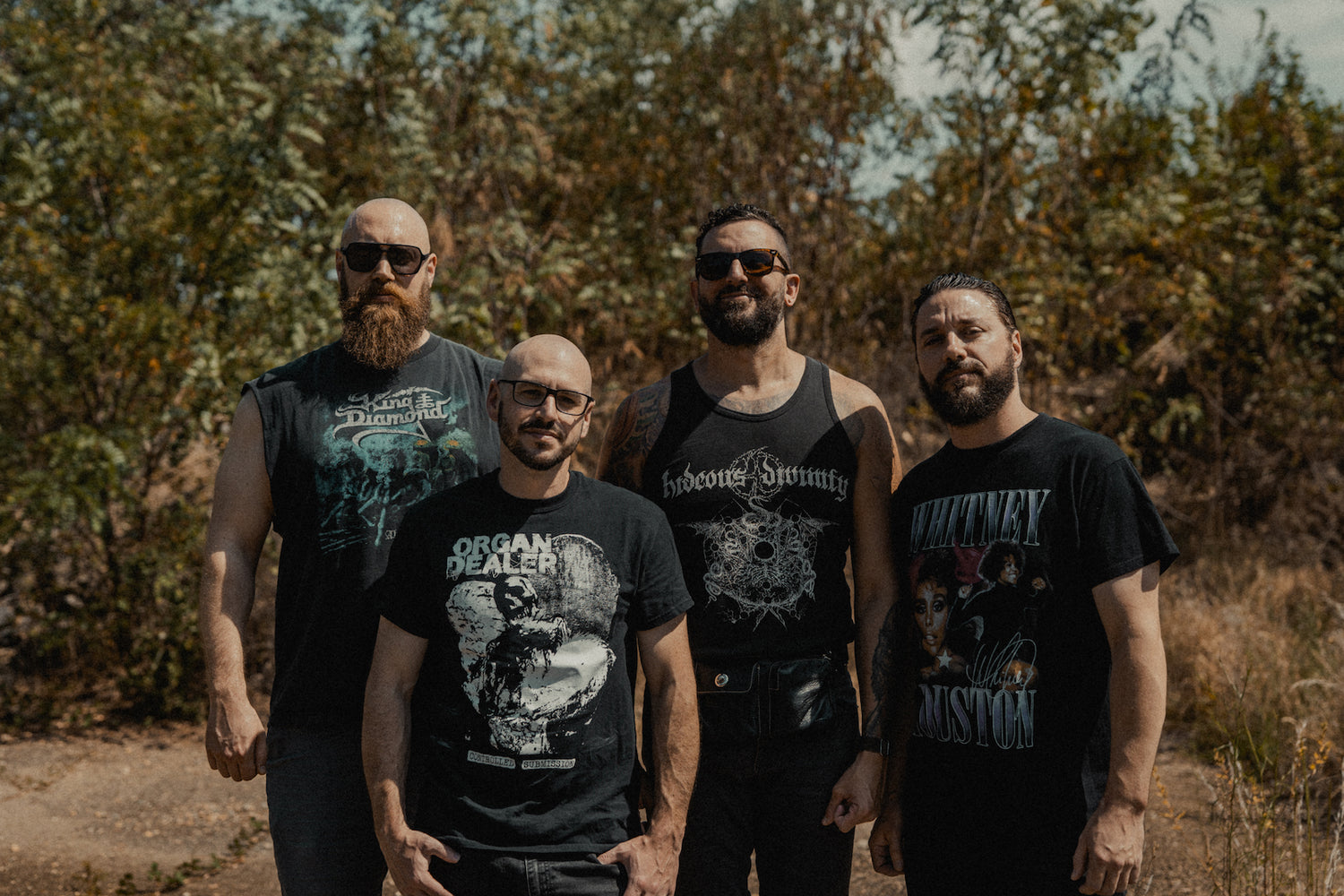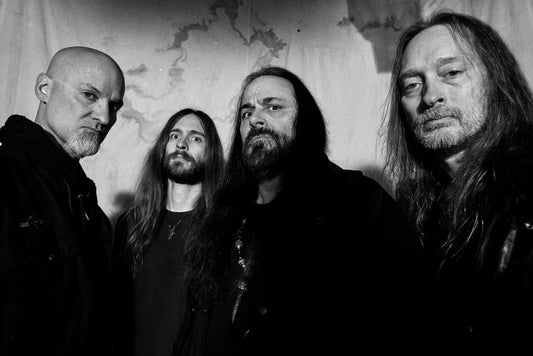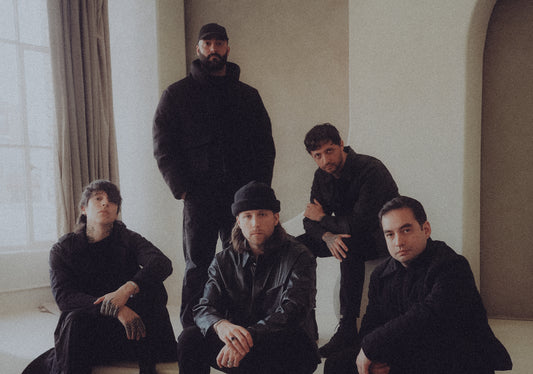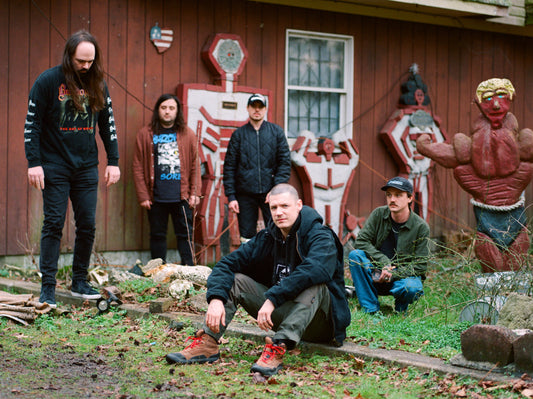Photo by Chris Klumpp
Job for a Cowboy have one of the strangest and most unique legacies in all death metal if you really think about it. Their emergence is one of the true pivot moments in the genre’s history, a band who truly defined a moment like no other and marked a new breed of heavy music being passed over into the hands of a new breed of young fans - before they immediately outgrew that mid-00s deathcore scene and defied expectations by flourishing into a subtle, even soulful progressive death metal band.
Their relationship with fans and cynics has been in a state of flux like few other death metal bands because of it, almost wholly defined by their context and surroundings at a given time, and a ten year gap between albums will really give you that time to reflect. Sun Eater was the most critically acclaimed album of their career. Then Job for a Cowboy disappeared.
Now a full decade on they return with Moon Healer, a direct and conscious picking up of the threads that Sun Eater put down, and to talk through all of what went on in that decade, why they stopped and how they brought together the pieces again, founding vocalist Jonny Davy brings us up to speed on where one of their generation’s great extreme metal gamechangers have been and are now.
First of all a massive congratulations is in order; a new Job for a Cowboy is done and near to be released, after all of those roadblocks and delays. How are you feeling?
Davy - It’s quite a tornado of emotions, reflecting on our past knowing that it’s now been ten years since our last record and about twenty since the band’s inception. At my age it feels like a bit of a fever dream, and that we’re actually gonna release new music.
In order to set the stage for the new album, we've got to go back to Sun Eater and ask: where did you go? A lot of people were really confused when Sun Eater was released but instead of playing any shows in support of it the band almost seemed to vanish into thin air for a few years.
Davy - Yeah we took a pretty strong and aggressive hiatus. We hit a fork in the road and drifted our separate ways with other priorities. I personally had fatherhood, other guys had academic degrees or technical careers. We always made it clear to each other to leave the door cracked open. We kinda all assumed that at some point in time we would get back together and the stars would align, we just didn’t know when. Finally that cracked door now is wide open.
The reason that absence was so noticeable is that people really chimed with the album and wanted more of it. When you put out Sun Eater and didn't go out to campaign for it, did it shock you to see how the reception and the legend of that album grew over the time you weren't out there?
Davy - It was very unexpected, to be honest, because I feel like the record before it Demonocracy we didn’t have that reaction. It might have been a little too technical and went over people’s heads, I’m not sure, but for whatever reason we didn’t see that reaction to Sun Eater coming and it was kinda bittersweet because it was at this point in time that we agreed to go our separate ways. Regardless of the reaction to it we were all in our own worlds and couldn’t make anything happen.
How did you know then when it was the right time to break the silence then and pick it back up?
Davy - One of the catalysts was we kinda had a soft start with the two guitarists Tony Sannicandro and Alan Glassman because Alan wrote a bit of a deathgrind record that we released a few years back for a band called Serpent of Gnosis. I think after that we realised how easy it was for us to do that and that triggered us going from side projects to going all-out with another JFAC record. The flow started again at that point.
COVID put another stumbling block in front of your return at that point…
Davy - Yeah it’s funny because we were finally scheduled to hit the studio right before COVID hit, Navene Koperweis who played drums on the record recorded around that time. Tony lives overseas though and couldn’t get over to the United States to complete it when everything went on pause. At the same time though I think it was kind of a benefit because it gave us more time to pick away and analyse the record. It was roughly 2018 that things started to come into motion with the writing, so really about half the decade that we were gone was making this record.
You did your comeback shows at Blue Ridge Rock Festival in 2023, joined by Will Ramos from Lorna Shore for Entombment of a Machine. Was that whole experience of hitting the stage again a really special moment?
Davy - It really was. It was very nerve-wracking as well, especially for a show that large. We actually did a really small warm-up show the day before unannounced under a secret name Above Ground Pool. It was just brutally hot and we had to cut the set short because we’re all turning into old men and we got heat exhaustion, more or less. Then we played Blue Ridge and it just felt like we never took the hiatus as soon as we hit that first note.
When you hadn't been on the road together for that number of years, what the band chemistry like coming back to it?
Davy - We’re all brothers. When Job for a Cowboy was very active we toured relentlessly. We were non-stop, and so if I don’t talk to one of the guys for five years when we do again it’s like we never stopped. Our relationship is like riding a bike.
Did it take much getting regimented back into the discipline of studio tracking, especially with music this technical?
Davy - We’ve done this so many times before in the past that as cheesy as it sounds it’s kinda second nature to be realistic. It was really easy! Obviously the process is painstaking, we’re nit-picking each other. As far as the music goes we’re very democratic and all have to give the thumbs up to every piece of music, otherwise it’s not gonna get released. But we were picking up where we left off and nothing really changed.
The music on Moon Healer continues to push further into the progressive direction of Sun Eater, arguably becoming even more dense and involved. These last two records in particular feel like they aim for a lot more atmosphere than the others rather than over the top brutality, which is a relatively uncommon thing in technical death metal. Does that feel like untapped territory that you're increasingly working out how to get the most out of?
Davy - Yes. I think what we’ve been trying to do is, it’s not forced but we make an effort to try and be different. I personally look at trends and see where things are going in this niche genre of death metal and I think we all want to stick out. We don’t want to follow those trends, and as we’re getting older our interests have changed a bit. We have a lot of amazing musicians, like Tony Sannicandro is really into jazz fusion, and Nick Schendzielos is an amazing funk bassist, so we really want to incorporate those strengths and not pigeonhole ourselves into just being a technical death metal. We want to put a magnifying glass on the things that our members are amazing at. We try to analyse what we excel at and really focus on that.
That certainly explains the slap bass on The Agony Seeping Storm.
Davy - Right! There’s quite a bit of it on the record.
Going back to the Demonocracy album again, with the song Tarnished Gluttony it really felt like you cracked a dramatic way of ending albums. Was that a landmark song for you? The Forever Rot this time is still finding things to pull out of that kind of approach.
Davy - Absolutely. We did that on our last record Sun Eater too, with each closing track being a longer and slower-paced song with a cinematic feel. We’re abiding by that tradition now and did that with this closer The Forever Rot. Tarnished Gluttony is probably one of our favourite songs as a band as a whole, and one of our favourites to play live, so that is definitely something we realised and wanted to continue on.
The title Moon Healer obviously connects this as a direct counterpart to Sun Eater. Was that a way to mentally connect right back to what you were doing as if you'd never been away?
Davy - Yes, the Moon Healer and Sun Eater tie-in is real, and that’s a good way to put it. In the end Sun Eater was a bit of a concept record and now we are continuing those concepts into a different area. The way we look at it Moon Healer is a part two to Sun Eater.
Back in the Ruination and Demonocracy eras you were amongst the more politically minded death metal bands, and the decade in which you've been away has gotten even crazier in that regard, but the concept here seems a lot more esoteric and philosophical. Can you explain that a bit and what drew you in that direction?
Davy - Definitely the band was a little bit more on the political side in those eras, focusing on any form of political corruption with a lot of the songs. As far as Sun Eater and Moon Healer, Moon Healer is a collection of songs that more or less tell the story of a close friend of the band’s in the past who kinda lost their sense of reality due to abusing hallucinogenic drugs very intensely. Because of that they seemed to grow symptoms of mental illness becoming schizophrenic and possibly expanding a bipolar disorder, and this person was also what you might consider a bit of a pseudo-alchemist. They were trying to find some sense of enlightenment in life and so would consume all these drugs and also formulate and create these drugs in a garage or in their kitchen, and that’s sorta what the record focuses on. It’s their mindset and their ideas. If you look at The Forever Rot there’s a character in the music video who is brewing drugs in their home and it’s representing that losing touch with reality and losing themselves in this search of trying to understand the universe.
You’re obviously drawing on a modern day example and real life experience there but that theme of alchemy and searching for the truths of the universe like that is very classic metal inspiration and part of a long tradition.
Davy - Absolutely, and this person was all about that. It was very interesting diving into that and learning about those ideas and beliefs. I grew in understanding, because Sun Eater was about the same person but that was more about how it directly in real life destroyed their life, and Moon Healer is more about diving deeper into what they believed in. I have a better understanding of this person now and it’s interesting reflecting back on it today.
Here’s an image question for the long-time fans: where's the ram's skull?
Davy - On the cover itself, there is actually one hidden. I’m not going to say where it is, you might have to find a higher definition image of it, but one vaguely exists in almost a ghostly, cloudy form. You can play the Where’s Waldo with the JFAC cover.
It feels like what the band represents and what you're associated with has really changed in these last ten years. Even though you moved away from that sound quickly the impact of the Doom EP and the association with the MySpace scene was so large earlier on and you were at times quite a divisive band, but with Sun Eater and the long wait of people asking you to come back and pick things up again, do you feel any noticeable change in how people view your band, or the level of respect you're given from the death metal genre?
Davy - Yeah man! I had this conversation recently, and when the band started out it was not highly respected in the underground metal world. I get it, we got tagged with the MySpace image and our EP blew up unexpectedly to us. To me in reality the only real deathcore release is that EP, and everything else has just been modern death metal with maybe a sprinkling of progressive, and in the end it was kind of in our benefit because there were people who hated the band for the sake of gatekeeping I suppose. When I look at how people look at our band today compared to fifteen years ago I think it’s vastly different. People have actually accepted Job for a Cowboy and the gatekeepers have let us in. I don’t know why that changed, maybe it’s just due to time and another generation of people coming through and coming to their own conclusions on the band, but I can tell that things are very different.
As you said it's been 20 years now since the start of the band, and it'll just be a couple more till the Doom EP turns 20. Particularly coming back from a hiatus, with the death metal world in a really different place to where it was when you were last releasing an album, how are you feeling on attacking this new era?
Davy - We’re totally ready to attack it, but at the same time we are just trying to please ourselves. If we really wanted to be extremely successful and had listened to what people told us we would have released the Doom EP multiple times over at this point. It sounds a little pretentious to say but this band is more for us to enjoy and create. I truly feel if it was the other way round our band would sound much different. We’re very excited though and very pumped to have a new record, and hope to get on stage very soon with this new wave of bands that have come in and go and show them how it’s done.
--------------------
Moon Healer, the first album in more than a decade from a Job For A Cowboy lands February 23rd via Metal Blade Records. Order the album - HERE





